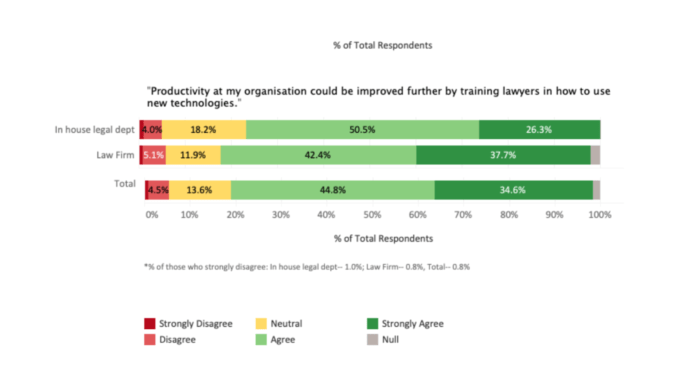
A survey from Oxford University has found that lawyers recognise that technology will boost their productivity – but equally that many are not making use of it, nor collecting and leveraging data to help their activities.
However, before we charge into the results, there is an important caveat: the survey group of 353 anonymous respondents was taken out of a random sample of 10,000 individuals selected by the Law Society of England & Wales across a very broad range of companies and firms, large and small – so, we have no idea what kind of firms and legal teams answered the questions. This creates a weak fit for certain questions related to the use of technology.
For example, it would be highly unlikely that out of the thousands of law firms in the UK that any of them outside of the top 100 were making broad use of AI doc analysis systems for M&A due diligence, perhaps even beyond the top 50. So, if you ask all lawyers in the UK about AI tools you’ll get a very skewed statistic that doesn’t tell you very much.
E.g. asking ALL lawyers about AI, is like stopping random people in the High Street and asking what they know about machine learning, as opposed to doing a survey outside of MIT’s computer science lab. For the former you could then conclude: ‘Machine learning is just hype.’ For the latter you’d conclude: ‘Nearly everyone is making use of machine learning.’
So, this site is taking the survey data with a hefty pinch of salt. The survey would have been a lot more meaningful if it could have been segmented into different parts of the market, eg. Top 10, Top 50, Top 100, 100 to 250, and then all the thousands of smaller law firms after that. The same goes for the inhouse teams, where the views of someone in the legal team at Barclays, which has massive doc review needs, may be very different to someone at Pizza Express.
With that said, let’s press on. First: recognising the productivity benefits of tech, (first table below).
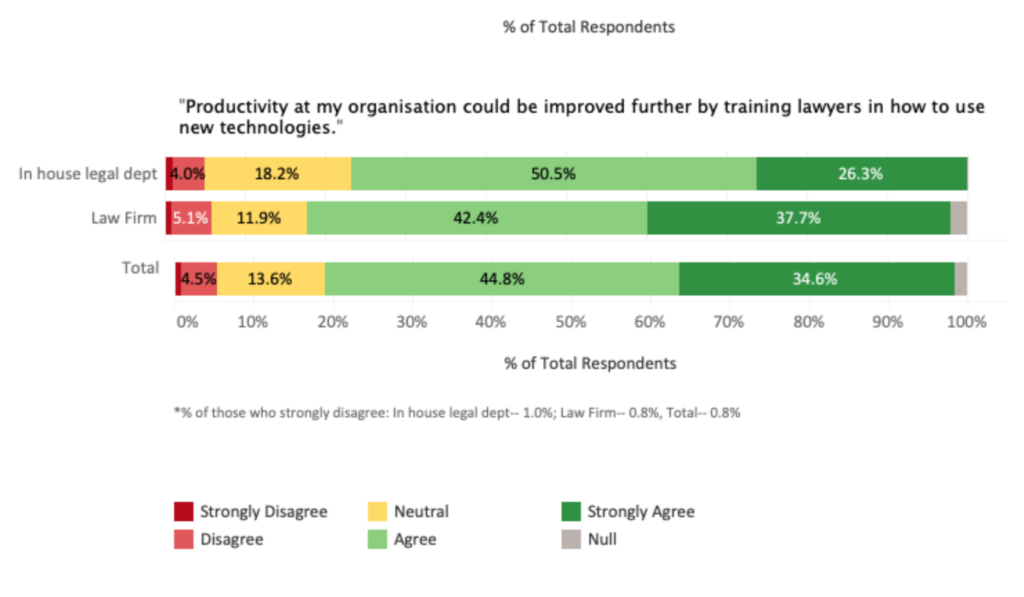
Around 85% of lawyers responded that tech will help boost productivity if they can train people to use it. And that’s a positive, because at least there’s a solid signal of understanding of what can be gained. It’s also couched in economic terms.
Law firms were also a bit more in agreement than inhouse teams and that makes sense, given they tend to be larger and are on the sell-side of the legal market.
Although, 4.5% saw no benefits in training staff in the use of tech.
Sticking with training, it’s fascinating to see that 71% of people replied that they anticipated training needs in the use of data analytics. It’s not known if the respondents knew exactly what this meant, but it sounds like they’d like to know. (See table below).
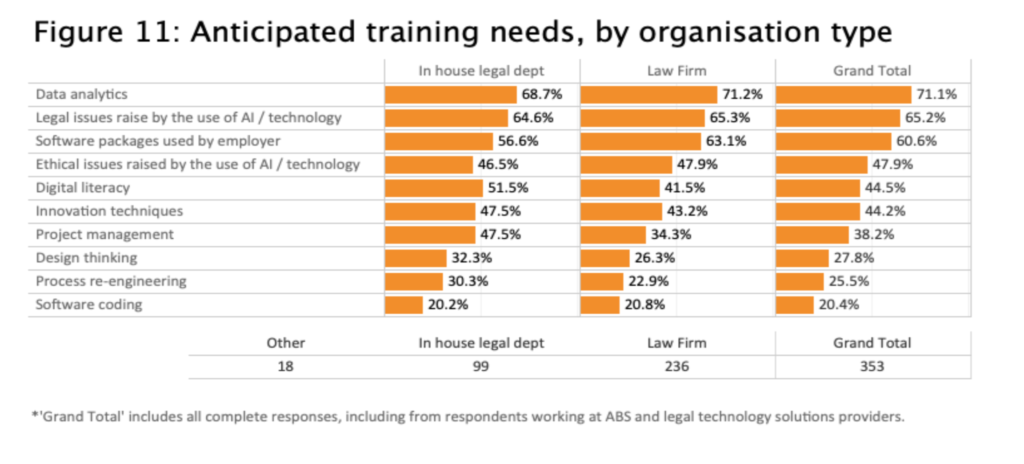
Although, 65% also want to know about ‘legal issues raised by the use of AI’ – which is really odd, given that advising clients on AI-related legal issues is going to be a very niche field that only a handful of lawyers will be involved in. And that’s worrying as it shows a significant misunderstanding of what is important. There is also a strange blurring of operational subjects and ‘the law itself’ subjects, which don’t have anything to do with each other.
And then, 60% say they want training in tech their firms/businesses already have. Which is nice, but does that mean 40% don’t want training in tech they already have?
And perhaps amazingly, 20% of lawyers said they thought they might need to learn how to code their own software. That is disconcerting, given that about 0.01% or less of lawyers may ever need to learn to actually write their own software. And those firms that do need to create their own software will hire in specialised teams to do that. So….that’s another signal of confusion.
Practical things like design thinking and project management were in there too, at 27% and 38% – which is a relief.
Overall this shows a real lack of understanding in the broader market about what is useful to learn. E.g. people want to learn about ethical issues of AI when they’re not even able to do project management. And 1/5 of the survey think becoming software devs on the side is a good idea, when 40% don’t want training on the tech they already have.
Again, part of this strangeness is due to the very wide and random sample, but even so, the results show a massive lack of understanding of what’s important.
Then we come to another interesting result. Only 19% say they are capturing data so that it can be used by legal technology. But, the gist is clear: if there is data somewhere in our business that we could use, we’re not using it. That said, given the sample this is also not surprising.
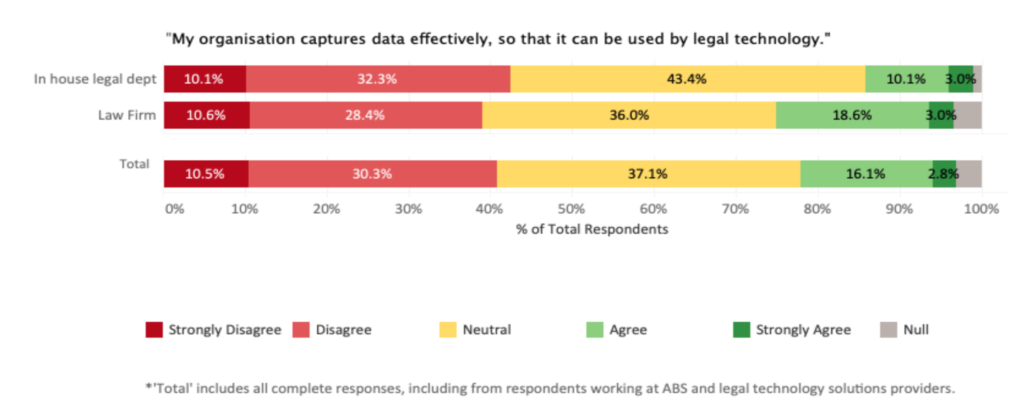
One last insight was about the use of AI technology. Nearly as many partners as associates said they were making use of AI for due diligence. This could mean they use it as much as associates – which would mean the cliché about older lawyers not using due diligence tech isn’t true. Or, it could simply mean the partners who replied were answering on behalf of the firm, or the teams they managed and who actually used the tech.
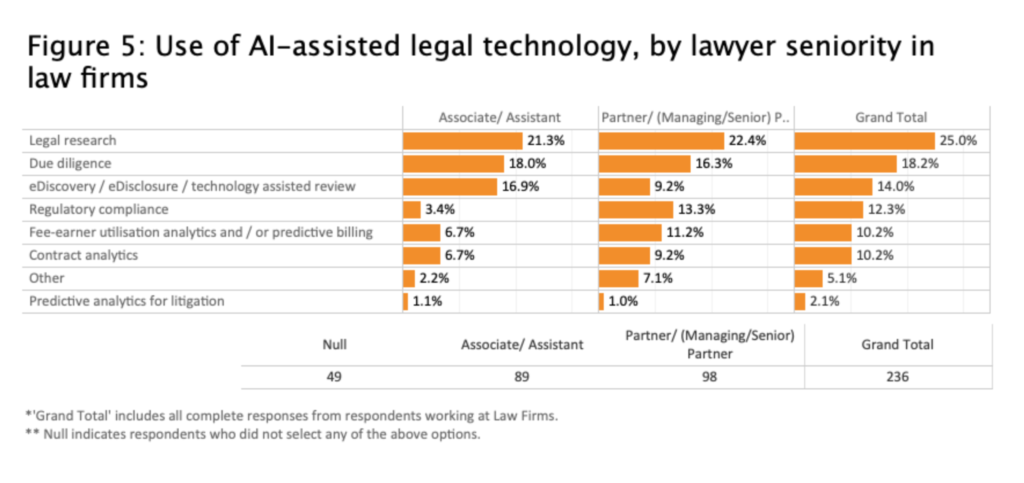
Overall then, a survey that provides several mixed and sometimes confusing messages, with the demographics aspect providing a problematic situation in terms of the results.
For AL, the big takeaways about the profession are:
- We are aware that tech can help, but (across this broad sample) we are not really using it, or the data our business creates.
- We have picked up on several themes as to what looks important, but have not really thought through what matters the most and may be focused on the wrong things.
The following report to the survey, which was led by academics Mari Sako, John Armour and researcher Richard Parnham, provides the Oxford team’s own views on the data. It can be found here.